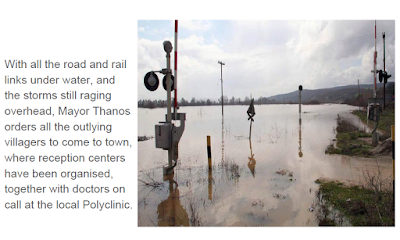Gerald Thwaites – The Invisible Bank Manager
It was 1999, and Gerald Thwaites was in his mid forties, when he started to become invisible. Running a small high street branch of Barclays Bank in Potters Bar, it was his secretary Fiona, who first spotted that his left arm was missing. Although the process was gradual, after six months there was very little left of him to recognize, and he found it increasingly more difficult to discuss business with his customers.
At first he decided to wrap himself in a clean bandage every morning to disguise his physical absence, but he had terrible problems in travelling from his home by train – where he lived in Colchester – and suffered ribald remarks like “Here comes Fred the Faro” and questions like “Which pyramid do you live in mate,” and “How’s mummy today?” This caused his general depression to increase, and his normal self esteem to almost leave him, but he was not a man to give up that easily.
Sometimes, he was difficult to find, but he continued to go to his office, although by now he had taken to sitting in a cupboard, and shouting to his customers through the keyhole. But soon his bosses at head office came to hear about his bizarre condition. Having worked for the bank for many years, they were reluctant to let him go, but suggested that he took some leave and some medical tests.
However, these tests were difficult to perform, because every time a doctor told him to take his clothes off, he immediately disappeared, leaving hospital staff extremely bewildered. His wife, Mildred, was of course very concerned, although to her he had been invisible for many years, and she only noticed him at all when she needed some more housekeeping money, a holiday, or a new car. Finally, his bosses suggested the use of a hologram.
Although technically successful, in the end this experiment did not work at all well. While ‘techno’ Gerald Thwaites would beam from the manager’s desk, as the real Gerald Thwaites shouted from the office cupboard, customers took to poking their fingers into the ethereal manager sitting before them, and laughing.
It was a complete failure. In the end, it was suggested by the management that he took early retirement, or look for a job where his absence would not be noticed at all. In the end, it was generally agreed that the best place for him to work was Bulgaria.
As it turned out, it was a wise choice. But he was not to know that at the time, as he invisibly stumbled naked onto a British Airways flight at Gatwick airport – which he was advised to do, in order to save the fare – nor was he particularly pleased when he arrived in Sofia Airport, in the cold light of a winter’s day.
In the absence of any difficulties with passport control and customs, within minutes of arriving, Gerald Thwaites found himself standing outside the airport. Wrapping himself in some old copies of the Sofia Independent he found, and hugging the rear end of a number 84 bus, he finally made his way to Sofia, and a new career in Banking.
Gerald Thwaites discovered the keys to his new apartment, under a stone in the garden, and a supply of fresh bandages in the bathroom cabinet. Finally, he had reached his destination. Being invisible had created certain logistical problems, but when he opened the wardrobe in the bedroom and discovered his clothes hanging there waiting for him, he realized that all was well. On the dining room table there were two unopened letters, so he sat down and slowly read them.
The first letter was from the First Reich Bank, confirming his appointment as administration manager. It was warming, and welcoming, and in it the managing director gave him two weeks to settle in, before starting his job. It was also pointed out with great amusement, that the whole point of his employer’s presence in Bulgaria, was to do as little as possible. According to Giles Hawthorn, his new boss, the current ‘in’ word in Sofia banking was ‘no!’
The second letter was from his wife, Mildred, which he opened with some concern, because she had not spoken to him, nor seen him for months. Uninspired and passionless she told him to wrap up warm, and not to drink too much alcohol. In her letter, she said – “I will personally take care of the family drinking, and I have already made arrangements with an off license in Colchester, for weekly consignments of gin.” At least this was one problem he didn’t have to face!
Mildred Thwaites
The bank was new, situated away from the town centre, from attendant prying eyes, and gossip. It was also easy for him to come and go from his office, without much attention being paid to him. During working hours, and being a man of determination – despite being invisible – he tried to improve his appearance by wearing a variety of fashionable glasses, and different coloured gloves, to compensate for his obvious absence.
One day Vera his secretary – who came from Slivin – told him that she found him very attractive, more so than previous boyfriends, whom she generally met at the International Club, where she went regularly. And, due to his wife’s protracted absence, they started a heated love affair.
Vera was known to like bankers, because she was deluded in the belief that they actually had some money. But she also found this new relationship very challenging, and at times somewhat confusing. Not knowing what Gerald looked like, it was not easy for her, to fake an orgasm, especially if all she could see was a bobbing white bandaged head, or occasionally nothing at all. This surreal aspect of their romance was often hard for her to cope with, especially when faced with unrelated gasps and expletives, which seemed to be unleashed from nowhere.
Professionally, Gerald Thaites was doing well, and after a few weeks he had mastered the art of confusion. He discovered that by finding different things wrong with a feasibility study, he could elongate his discussions with customers for up to six months, before saying “Yes, you cannot have a loan, or no, you can have a loan, but it’s got to be more than $3 billion USD., so we will have to organize another feasibility study!” It was all good for a laugh, and well within the bank’s policy strategy.
Meanwhile, his wife, Mildred, continued to write – often incoherently – informing him that she would not move to Sofia, unless they opened a Marks and Spencer store. But, by now, Gerald found this all rather reassuring, especially since Vera announced that she had become mysteriously pregnant.
She insisted that Gerald got a divorce from Mildred, and that they should get married – despite his somewhat unusual appearance – although, from time to time, she did express some anxiety about giving birth to a number of bandages, or even, giving birth to an invisible offspring which would keep getting lost. It was not easy for her to comprehend, but nevertheless in her own heart, she believed that she had Gerald Thwaites completely ‘nailed.’
He of course thought differently, knowing that he could escape at any time, by simply ripping off his cloths, and flying back to England. After all, it would be difficult to prove the true culprit, as it would be to identify him by a DNA test. He could simply disappear again, but this time, for good! All this would have been easy, but then suddenly, something rather odd happened.
One day, when he was attending a meeting at the ministry of finance, when Gerald Thwaites shook hands with the Prime Minister, and the Minister of Finance, a remarkable thing started to happen. Gazing at the empty sleeve of his jacket, during the ensuing heated discussion, he noticed that his right hand was slowly becoming visible once more. This made him very concerned, and not a little confused.
Whereas Gerald Thwaites had reached a new hiatus with the re-emergence of his right hand, and his somewhat fawning relationship with Vera his secretary – who came from Sliven – now that the days had rolled into weeks, and the weeks into months, his bandaged and shambling form, had become a part of the Sofia scenery.
In the warmth of an early spring, Gerald now found a peculiar freedom, and was often seen in public – occasionally wearing a loud Caribbean shirt – with Vera at his side; shy reticent, and inclined to use the side streets. But then things took a turn for the worse. Because Mildred, his wife, suddenly changed her mind.
In the past, she had clearly stated that she would not move to Sofia until there was a Marks and Spencer’s store, but she now found herself motivated by greater events. In a rather incoherent and rambling letter, Mildred declared that she would now be coming to live once again with Gerald.
In her letter she wrote – “ I have been assured by the manager of Threshers my off-license in Colchester, that gin is cheaper in Bulgaria, and since it is incumbent on me to be responsible for the family drinking, I shall be arriving shortly, as soon as I have consumed, my last crate of Gordons.” The facts were made abundantly clear to him.
The letter then stumbled on, into lesser details, where questions arose about the wholesale price of lemons, and tonic water, together with a strangely unconnected question about Marmite! But nevertheless, Gerald felt in his bones that the game was up, when she asked for detailed information about what sort of social life she could expect? What was the ex-pat community in Sofia like? Where could she safely go and drink gin and tonic? Who would be her friends? And finally, was there an International Women’s Club? Gerald did not know what to reply.
As previously explained, in England, Gerald Thwaites had been invisible to his wife Mildred for years, even before he had actually become invisible, so he found it quite difficult to give a clear answer.
Luckily, as spring progressed, by the time the heat of the summer had arrived, his passion had begun to cool for Vera, who was now curiously courting another without any mention of her pregnancy, now obviously forgotten. They had met one quite night at the International Club, where she had found Geralds replacement. A rather large and ancient American bank manager, he was given to reading feasibility studies to Vera in bed, as a small part of her new, arduous and tiring duties.
But, Gerald was not broken hearted, on the contrary, he felt relieved, because he had become cogently aware of the many wagging tongues which could quite easily find their way to Mildred. The International Club was like a leaky sieve, when it came to protecting ones private life, and keeping secrets! But, this was a chance he had to take.
Mildred finally arrived one hot and sultry day, and having been badgered and messed about at the airport, she was not in a very good mood when she met Gerald at the reception point. He was surprised how much she had changed, and for her part – despite his bizarre appearance – she was similarly surprised by his obvious popularity amongst visitors to Sofia Airport; due no doubt to his occasional interviews in the Sofia Echo. Now, despite his anonymous demeanour, she saw him differently. Looking at the motionless white bandaged blob before her, she thought ‘Perhaps they were right? Perhaps Bulgaria was the right place for him?’
Trying hard to forget all those sultry nights spent with Vera, Gerald now attempted to look upon his wife Mildred with greater interest. Dressed for a garden party at the palace, she had brought her ‘aspiring middle class’ fashion to Sofia. Mainly purchased through a somewhat outdated Freeman’s Catalogue, and looking like some incongruous ‘Aunt Sally,’ she stood out against the backdrop of black frocked Bulgarian women, who all seemed by contrast, to be more suited to certain activities of the night. Gerald was a man who now knew about such things, and as Mildred took the tiller of Gerald’s life once more, she placed cold fear into his heart.
On the journey by taxi to Sofia, Mildred was very curious about Gerald’s six months of freedom. How much money was he making? What sort of car did he have? How much was the rent on his flat? What sort of expenses did the First Reich Bank give him, and finally, how much would he give her? Once more – in her mind – he had relapsed into this pathetic money-box she had always perceived him as.
“And, which clubs do you belong to, here in Sofia, Gerald” – she demanded to know, and Geralds mind raced, as the questions dug deep into his private world? Perhaps in a former life, Mildred had worked for the Gestapo, because as he stuttered and prevaricated, in his mind’s eye, he somehow saw Mildred dressed in a black SS nazi uniform! But realizing that his long nights of passion would now be replaced by cups of Horlicks, and hours of mental repression, inspiration suddenly struck!
“Why don’t you join the diplomatic club, there are lots of people like you there. I am sure you will find a lot in common.” It was the answer to his prayers, and then, in order to placate her even further, he said – “Oh, and downstairs where we live, I forgot to tell you Mildred, there is a garage shop which sells Gordon’s gin at a special discounted price.” Finally, he falteringly said – “I am sure you will get on very well here, Mildred.”
But not even Mildred – who had very little imagination – could doubt the look of cold fear, hidden behind Gerald Thwaites bandaged head, as he made these amiable remarks in an attempt to appease the situation.
Mildred for some reason found her feet quite quickly at the Diplomatic Club, as she fondly referred to it. Meeting diplomats and their wives, the leaders of business, and the experts which surrounded them, her mind was soon opened to the rich history of Bulgaria as she listened to the profound opinions of those whose job it was to to know, and understand.
“We live in momentous times,” she would fondly say, as she often recounted little gems of history, she had managed to glean between gin and tonics. “Did you know Gerald,” – her accent had recently become singularly reminiscent of Margaret Thatcher – “That Todor Zhivkov is a member of the currency board, and that his late daughter, Lyudmila, built the town hall in Cricklewood? ” It was then that Gerald Thwaites started to plan his escape.
Although just a daydream at the time, unfortunately, there were two major things missing in his plan. Firstly, he needed lots of money, and secondly somewhere to go, and although the fact that he was almost invisible, was part of his envisioned plan, one day – as he inspected the drawings of the bank and the codes to the safe – he realized that his plan was very real. After a few more weeks of Mildreds humiliation and bullying, he put his plan into action.
It was four o’clock in the morning, and Gerald Thwaites sat gloomily in the broom-closet on the first floor of the bank. Agonizing over his decision to evaporate from Bulgaria, and with the seemingly static passing of time, it was a moment of painful self-analysis and heart searching for him. This was because, he was not only escaping from his ghastly lawful wife, but he was propelling himself into the murky world of criminality, and that of the eternally pursued. Like some sort of invisible Ronald Biggs, he would now have to travel the world as an outsider, waiting to be trapped in some South American hellhole, by a latter day ‘Slipper of New Scotland Yard;’ or some humourless German equivalent.
However, the Bulgarian police would not be after him, a matter he had skillfully arranged by the handing over of a brown paper envelope to the First Secretary of the Ministery of The Interior. Gerald knew where this government ministers girlfriend lived, and the number of his safe deposit box at the bank. There were ‘no flies on Gerald Thwaites.’
The only trouble was that there actually were a few flies on him! As he thrashed about in the cupboard in pursuit of an elusive and irritating insect which was attacking his naked private parts, it seemed that his entire world was deteriorating in total confusion, if not into Bedlam. The sound of a mop leaving its resting place in a tin bucket, the sight of a seemingly detached and whirling luminous watch, the smell of sweat, together with the cold sense of fear, made Gerald picture his grotesque wife, and the options left open to him. Anything was better than a life of utter despondency and servitude.
Finally, the combined smell of gin and Horlicks suddenly pervaded his tortured memory, and instantly put paid to any lingering doubts about his leaving. The constraints imposed on him by this great wobbly tyrannical wife, totally ended any passing feelings of guilt.
Repressed in every conceivable way, it was Bulgaria that had opened his eyes to the realities of life. Thinking back to the day he had arrived on the back of the number 84 bus, the discovery of cheap and good quality bandages to disguise his invisibility, the sudden passion inspired by Vera from Slivin; all this had turned him into what he perceived as the glorious menopausal Renaissance man he was today.
In common with the many other foreigners who inhabited the four ale bars of Sofia, he had finally realized that there was life after the age of fifty, and that sex and Rock ‘n Roll still existed as an option, even though the record had become a little scratched over time.
From now on life would be better – moreover, even exciting – and his duty towards his awful lawful wife, was at an end. There would be no more early morning tea, unending washing up, and embarrassing bleary breakfast explanations. In fact, no more anything!
The thought of his depressing perennial morning journey to his wife’s bedroom – tripping over, over-laden ashtrays, and half empty glasses of gin – his slavish apologies for the sloppy milky tea, and her constant bleating demands for sex; this would now come to an end.
A fly which had catapulted itself up Gerald’s nether regions, simultaneously catapulted him through the cupboard door, causing him to crash into a fire extinguisher, injuring his already irritated private parts. Sitting on the floor of the carpeted corridor, Gerald took a few minutes to recover, before making for the stairs, and down to the basement. This was where he confronted the massively intricate safe. He now knew all the codes, and full full instructions on how it operated, but the greatest challenge was to get his timing right.
He knew that the automatic clock would allow the tumblers to disengage at exactly eight o’clock in the morning. In the past, he would be the first to arrive at the bank at this time, having been delivered to the front door, by the banks limo. But at four in the morning, there was little hope for him opening this German monolith, without the assistance of a quantity of Semtex B. He had acquired half a kilo from a dodgy Bulgarian, soldier who used the bank, and some jetex fuse. He had bought it from the local model shop, together with a balsa wood model of a Hawker Hunter Mark III jet aircraft.
Having spent two weeks assembling this model, in what little spare time Mildred had allowed, he at last had the final alibi necessary to create the required explosion. This would disassemble the door to the safe, which he had timed for six o’clock sharp, leaving him ample opportunity to inhibit all the security devices. A piece of cake, because he was used to this procedure as a part of his daily routine, all that remained was how to assure his escape. That was the question?
Situated in Doctors Gardens, the bank had been built in a mainly residential area, so a loud bang at six in the morning had no fears for Gerald, knowing the great majority of local residents were foreigners, who would have been drinking heavily until all hours of the morning. A massive explosion of Semtex would not arouse them from their slumbers, nor their incumbent girlfriends, who seldom if ever emerged from their beds until well past midday. In that part of Sofia, few people were about at that time of the morning, including street cleaners, criminals or even policemen. But how would Gerald get away with a cool five million euros, which was his firm intention?
In the past, his determined analysis has precluded the use of a mountain bike or a car, as the sight of a riderless bicycle or a driver less car, might have provoked some interest from a casual observer, as he propelled himself towards his final destination, and freedom. Even in Sofia this would have been considered an unusual sight, so other means for his final exit had to be sought!
Five million Euros in 500 Euro notes is not a very bulky item in itself, and it fits neatly into a large military sized rucksack. Having discounted cars and bicycles; in order to make his final escape, Gerald had simply planned to casually jog through town to Sofia Airport, with the money strapped to his back. Ever considering the vast weight that the five million would represent – and the mental determination required in order to carry it – he had trained diligently to raise his physical status, by running up and down stairs at the bank, for the preceding three months, and not using the elevator.
His final plan was simple. For his final escape, he would wear a pair of inconspicuous red Nike trainers, together with a pink jockstrap for his own personal comfort. Whilst carefully painting his Hawker Hunter Mark III bright red, he had also painted Pizza Express on the rucksack that was ultimately intended for his final departure, which he knew it would work, and wouldn’t look out of place in Sofia; it was a cinch!
Promptly at six an almighty explosion rent the air in Doctors Gardens. As expected, there was no reaction, except by some nervous pigeons which took flight at the sight of some shattering glass, and falling slates. A dog barked, and a car alarm went off, but other than that, with quite a lot of dust and debris, nothing else happened.
Gerald was gleeful as the great steel door swung open, to reveal a cloud of fluttering banknotes, having used a tad more Semtex than was necessary. Most of the damaged cash was in the local currency, which was of no interest to our now successful bank robber, as he clambered into the gaping vault to retrieve the stash of Euros he had carefully earmarked the day before. Carefully stacked in a secluded corner, and neatly packed for transit, the flat bundles easily fitted into the Pizza Express rucksack, which he had kept hidden in his office. Gerald was delighted. Donning his red Nike trainers, and putting on his recently laundered colour coordinated jock strap, he was ready to set out on the journey of a lifetime.
Finally away from his appalling wife, Mildred, the ghastly bank, his broken hearted relationship with Vera, and the incredibly boring fellow members of the International Club for Foreigners, Sofia was shortly to become history! Gerald Thwaites never looked back, and reappearing bit by bit, is now a respected ex-pat, happily living in Havana. Now his legs have become visible once more, Gerald is now learning to dance The Tango!
Patrick Brigham
















































